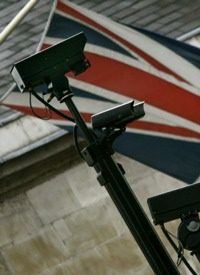
In a scenario that could have come from George Orwell’s famous book 1984, a controversial government surveillance system that uses hidden microphones to snoop on public conversations in Europe has been exposed. And it’s already drawing strong criticism from privacy advocates.
The technology, known as “Sigard,” works by detecting “aggressive” or fearful speech patterns and warning officials, who can then use surveillance cameras to zoom in while authorities make their way to the scene. Its deployment has been especially widespread in the United Kingdom and the Netherlands.
"We connect microphones that listen for aggressive sound and once they have a match with the aggressive pattern, the camera will automatically move to the aggressive sound and there will be a pop up on this screen which says there is aggression at this and this location," Derek van der Vorst with Sound Intelligence, the technology’s manufacturer, told the BBC.
The system “is a very reliable method of automated detection to combat crime and antisocial behavior,” according to the company’s website. “Ninety percent of all incidents involving physical aggression are preceded by verbal aggression. The ability to spot verbal aggression before it turns into a violent outbreak delivers valuable time to security personnel and enables speedy intervention," it adds.
Some of the technology’s other “benefits” are also listed on the site: "It increases the chance of arrest and prosecution" and "one operator can keep track of more cameras."
Company officials and governments have refused to rule out the possibility that the devices will be used to record conversations. And the microphones can eavesdrop on conversations up to 100 yards away.
But despite any alleged upside, civil-liberties activists and newspaper editorials have blasted the system’s “Orwellian” nature, calling it a violation of privacy and the hallmark of a police state.
"There can be no justification for giving councils or the police the capability to listen in on private conversations,” Big Brother Watch campaign director Dylan Sharpe told the U.K. Telegraph. "There is enormous potential for abuse, or a misheard word, causing unnecessary harm with this sort of intrusive and overbearing surveillance."
Corinna Ferguson, a lawyer for the human-rights organization Liberty, also attacked the system. "Britain has been far too complacent about the growth of CCTV without any proper public debate or legal safeguards. With cameras linked to microphones and number-plate databases, everyone can be treated as a suspect," she told the Daily Express newspaper.
"The Birmingham fiasco demonstrates the destructive power of snooping on whole communities," she added, referring to the revelation just days ago that the government was aiming license plate-reading systems at Asian districts in Birmingham.
In a separate piece, the Daily Express lashed out against the new snooping system, calling it “yet another unacceptable erosion of our personal freedom.” The editorial, entitled “Big Brother at Every Turn,” suggested the technology was an attack on free speech and that “one wrong word” could land somebody in jail.
“It’s bad enough that we’re all under almost constant surveillance from CCTV cameras,” the paper continued. “We’re sure readers can think of several very succinct words about being spied on in this way which would make the snoopers’ ears burn.” It is estimated that the vast camera network in cities like London helps solve one crime per 1,000 cameras.
Another U.K. editorial was equally harsh, though it took a more humorous and sarcastic approach. Proposing surveillance cameras and microphones in every home and office, the Herald in Scotland explained: “It won’t just leave terrorists with no place to hide, it’ll expose criminals wherever they’re holed up or plotting.”
“Isn’t this the logical extension of what is already happening, of what we’re allowing with barely a squeak of protest?” wondered the paper in its editorial, "We’re watching our freedoms vanish thanks to spy society." “The police could be at the door, handcuffs at the ready, before a drunken man can punch his wife or say ‘domestic violence.’” It also sarcastically hinted that child abuse and burglary could be abolished.
Noting that there are already cameras that allow officials to chastise subjects being monitored via a speaker, the piece suggests that “government health initiatives could be encouraged: a warning could be broadcast every time someone lights a cigarette. Meal times could be made wholesome by reminding parents to eat at a table and provide their family with five portions of fruit and vegetables a day. Secret drinking would be secret no more.”
The editorial goes on, concluding: “Previous generations have fought wars — both civil and international — in the cause of freedom. They chopped off a king’s head for freedom.… If we throw it away without a fight, we will be betray the generations that are gone and rob those still to come.”
At least a dozen cities in Holland use the microphone-spying technology, as well as Dutch prisons and public transportation systems. It has been “tested” in U.K. cities including London, Birmingham, Glasgow, and Manchester. And if Europeans (and even Americans) don’t rise up to stop it, the intrusion will undoubtedly spread.
The European Union, meanwhile, is funding its own “Big Brother” spying technology under a project uncovered last year known as “INDECT.” That system will compile data from personal computers, the Internet, CCTV cameras, and other sources with the goal of "automatic detection of threats and abnormal behavior or violence." Pre-crime, in other words.
The degree of surveillance and accompanying loss of privacy that people worldwide are being subjected to is alarming. And rather than slowing down, available evidence indicates the troubling trend is accelerating. It’s time for citizens to draw the line and hold their public servants accountable, lest a future reminiscent of Orwell’s dystopia come to fruition. If the madness proceeds much further, it might be too late to stop it.
Photo: AP Images



